Aung San Suu Kyi wanted blueberry cheesecake.
"I had quite a close professional relationship with her," says Ron McMullen of the Nobel Peace laureate and Burmese political leader with whom he worked while serving as a U.S. diplomat in the politically volatile nation that has experienced genocide, human trafficking, and systematic rape, among other human rights violations.
McMullen, now a visiting associate professor in the UI Department of Political Science, says in 2002-03, the first year he and his family were in Burma, he served as the U.S. embassy's main point of contact with Suu Kyi.
One day when she was especially weary, McMullen and his family invited her over for a meal so she could relax. No official talk, just food, family, and fun.
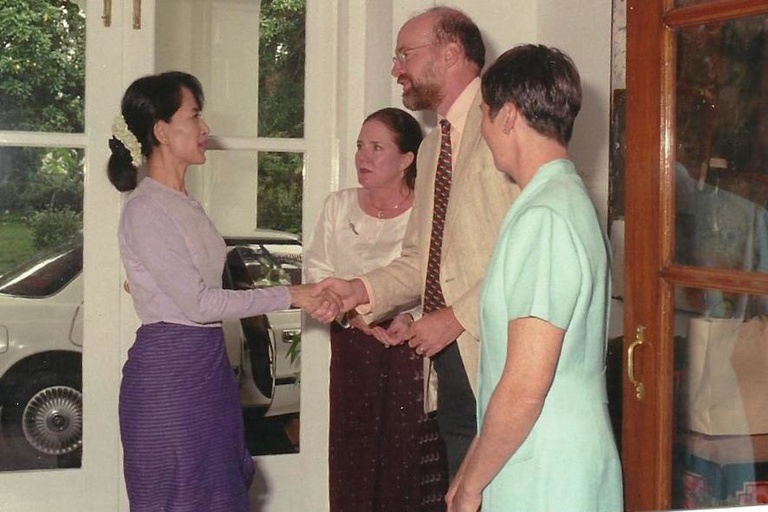
"And blueberry cheesecake, a rarity in Burma. That was her one request, and my wife Jane was able to fulfill it," McMullen says, remembering how Suu Kyi engaged his two young sons in conversation about their interests and activities.
Later, when she was imprisoned, Suu Kyi would sometimes slip a note rolled up into the hem of a purple longyi (sheet of brightly colored cloth widely worn in Burma) as she sent it out to the laundry with messages specifically intended for McMullen.
The first one alerted McMullen to the fact that she was going on a hunger strike. Another contained information that was intended to be helpful to the work that the U.S. embassy was doing to support pro-democracy activists.
While serving in South Africa, McMullen marveled at how Nelson Mandela deftly and diplomatically controlled a sensitive negotiation when then-U.S. Secretary of State Warren Christopher wanted South Africa to commit to the Africa Crisis Response Initiative in the wake of the Rwanda genocide.
"The U.S. was hoping there could be an African wide group of countries that would be the first responders to civil conflict and natural disaster rather than having the U.S. or the United Nations have to do it," McMullen says. "President Mandela was not in a position to commit the South African military, which was undergoing a very difficult transition of its own."
Instead, Mandela played the role of gracious host, shaking hands and asking everyone where they were from, paying particular attention to McMullen, and offering cookies while chatting at length. The deadline was tight, and Christopher had a plane to catch.
"Nelson Mandela ran out the clock, and Secretary Christopher was getting increasingly agitated," McMullen says, "and eventually President Mandela sat down, and Christopher gave this very lawyerly explanation of why this would be good, and Nelson Mandela said, 'You've explained this so well, but it's such a complex, interesting issue that we really need more time to think about and discuss this. And I know you need to leave in five minutes, but thank you very much.'"
A fuming Christopher left to catch his airplane, without closing the deal while everyone else was floating on air due to Mandela's warm-heartedness.
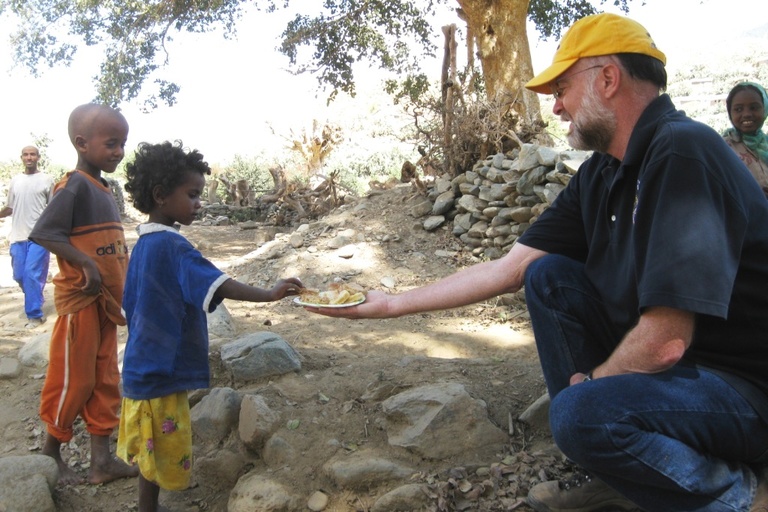
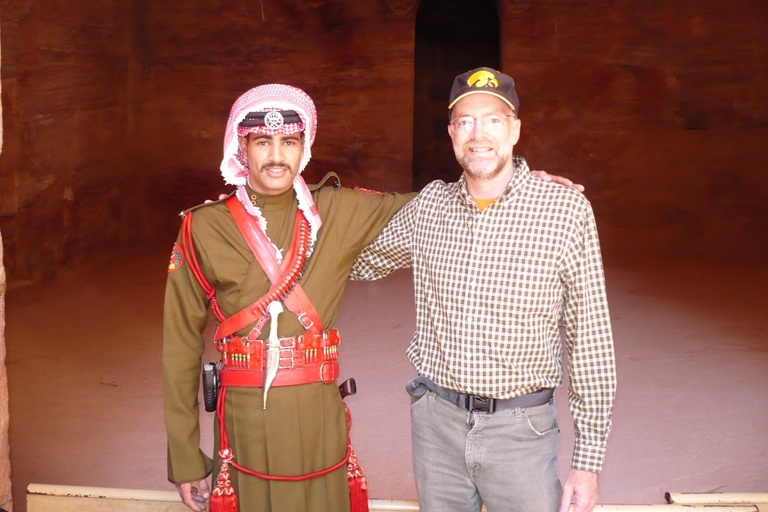
Dodging bullets, negotiating delicate deals
During three decades of work as a U.S. Foreign Service officer, McMullen has lived, worked, or traveled in 91 countries. He has met kings and presidents, but has also worked with poor indigenous communities, interviewed thousands of visa applicants, and worked with colleagues in embassies around the world.
He's found himself in dangerous environments, dodging bullets, and negotiating delicate deals.
“I served in seven overseas posts and each one had uniquely good and less good aspects,” says McMullen, a native of Northwood, Iowa, who received his doctorate in political science from the UI in 1985. “Being an American diplomat is the best job in the world. We promote American interests and values overseas, largely by developing relationships built on trust and mutual respect.”
He adds it’s been an amazing journey but he’s grateful he can come home to Iowa and spend time on the campus where his international interests took root.
" One of my aims is to share my interest, curiosity, and excitement about the world with students."
—Ron McMullen
McMullen has served in the Dominican Republic, Sri Lanka, Gabon, West Point, Washington, D.C., South Africa, Fiji, Burma, and back to Washington where he worked on issues with Afghanistan, as the U.S. ambassador to Eritrea, and then as a diplomat-in-residence in Texas.
McMullen's experiences are as diverse as the countries where he’s lived. In Burma, he worked closely with Suu Kyi and pro-democracy groups. While posted in Fiji, he helped prevent civil conflict after an armed takeover of parliament.
He was shot at during a riot in Sri Lanka and helped trained mongooses to detect heroin. McMullen also survived a voodoo curse in the Dominican Republic and took Hillary Clinton on a tour of South Africa’s Robben Island with Mandela.
'Pirates, Politics, and Development'
All of these adventures create compelling content to share with students.
This past academic year, McMullen, who is part of the Political Science Department in the UI College of Liberal Arts and Sciences and International Programs through the UI Office of the Provost, taught courses on the Middle East, the Horn of Africa, Southeast Asia, and Southern Africa.
His Horn of Africa class last fall was titled “Pirates, Politics, and Development.” His courses are popular and fill up fairly quickly. He says he sets the bar high for all of his students, and deploys a highly participatory style of teaching.
“I really want my students to be engaged with me and their peers in the class," McMullen says. "They have to do presentations, stand up briefings, and be prepared for classroom discussion.”
McMullen keeps posters of his personal heroes—Mandela, Suu Kyi, and Albert Schweitzer—in his office in Schaeffer Hall, where students now tap into his time to get opinions on whether they should study abroad, join the Peace Corps, or pursue overseas internships or teaching experiences.
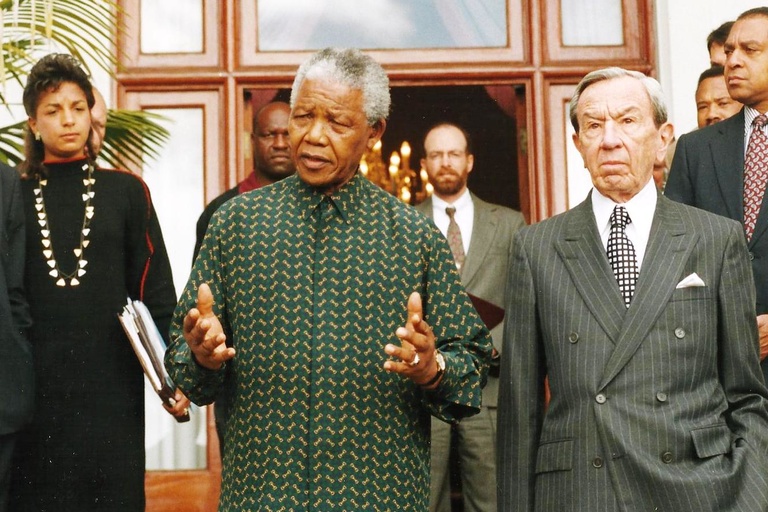
“Despite being in jail for more than 20 years, Mandela lived his values, and came out not bitter but seeking reconciliation and progress for everybody. How many of us would do that?” McMullen says.
These are insights and influences he tries to pass on to his students as life lessons. While other professors focus more on methodology and theory, McMullen says he brings “policy relevance, experience, and enthusiasm” to his students.
"One of my goals is to interest students in international relations and comparative politics and show them it can be fun and exciting and just full of adventures and policy choices that they may not have considered," McMullen says.
Skyping with Iowa Lt. Governor
In January, he assigned students in his Southeast Asia class to small teams in the role of consultants pitching a particular country destination for an Iowa Trade Mission to be led by Iowa Lt. Gov. Kim Reynolds and the Iowa Economic Development Authority. The objective was to find good partners for Iowa exports and new sources of investments in Iowa.
“A month after I made the assignment, Kim Reynolds announced that she was taking an Iowa trade delegation to Asia so this assignment was sheer serendipity,” McMullen says. "I invited the lieutenant governor to come to class and tell my students how she organized her trip, how she conducted it, and what the results were."
Although she couldn’t physically come to class, McMullen used Skype to have a conversation between Reynolds and his students about the trade delegation to Vietnam and the Philippines this past spring.
“I wanted my students to see the connections between the well-being of Iowa jobs and educational exchanges with Southeast Asia,” McMullen says. “I try to find some connection to make it more personal.”
In addition to his teaching, he does a great deal of international engagement and outreach.
This includes everything from giving a lecture on Wikileaks to the Iowa City Foreign Relations Council to speaking with the UI Fulbright Committee, the Council for International Visitors to Iowa Cities (CIVIC), the United Nations Association, and the UI Honors Programs. He also joined the UI Faculty Engagement Corps on a listening tour of northwest Iowa May 21-24.
Young Corn comes home to Iowa
McMullen says he and his wife have always felt like Iowans, wherever they’ve gone. In fact, they have a print of Grant Wood's "Young Corn" they have displayed in their residences overseas.
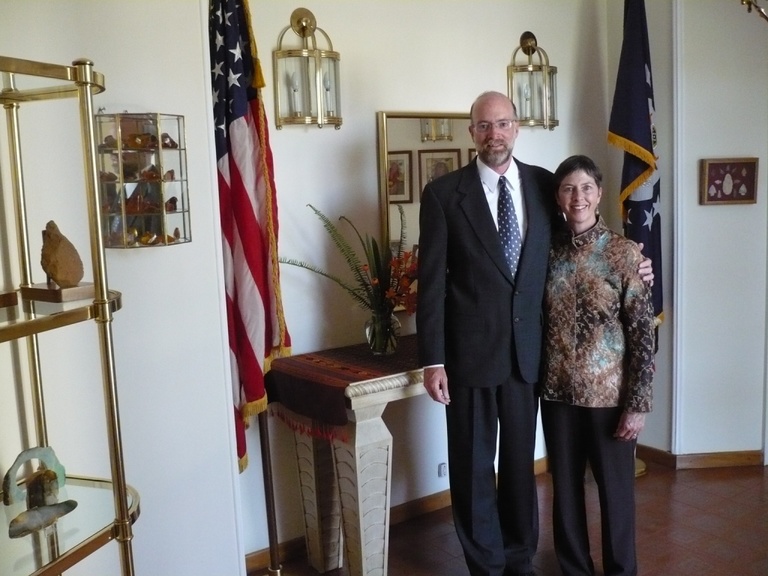
Since McMullen's wife is an Iowa City native and also a UI alum, with a Ph.D. in French, it made perfect sense to come to the UI, especially since his wife followed him on his globetrotting career.
He says it was time that he followed her back to the campus where they first met as graduate students in Schaeffer Hall, the same building where he now has his office.
What prompted McMullen to leave the state department after 30 years?
“While I think being a Foreign Service Officer is the best job in the world, the fact that it’s also a hierarchical bureaucracy takes its toll,” McMullen says. “Since I have a PhD and ambassadorial experience, I thought maybe it’s time to capitalize on that combination of backgrounds.”
McMullen can relate to many of his students since he grew up in Northwood, a small farming community of less than 2,000 people in north central Iowa where his dad was a high school physical education and social studies teacher and his mom was a homemaker and a 4-H judge.
“I had a very typical Iowan upbringing,” McMullen says.
Postcards with hippos
One of his first memories of being exposed to the broader world was thanks to his favorite uncle who went to Gambia as a Fulbright exchange teacher when McMullen was a kindergartner. About the same time his family bought their first set of World Book Encyclopedias.
“When we got a postcard from Uncle Jerry featuring, say, a hippo, my mom would get out the H encyclopedia, we’d lay on the living room floor, and look up hippos," McMullen says. "This gave me some notion that there was an exciting big world out there.”
McMullen’s family also hosted a Brazilian foreign exchange student when he was in high school. As a graduate student, he also studied abroad in London and as a graduate student, served as a State Department intern in Sudan.
Coming full circle
McMullen says it was his own college experience that opened his eyes to international possibilities. He hopes this happens for his students, too, especially with the significant growth in UI international student enrollment at the undergraduate level.
“As a graduate student at Iowa, I shared an apartment with another political science grad student from Austria, Ilja Luciak, who was in many of my classes,” McMullen says. “Ilja was a socialist and looked at international relations and development issues very differently than anyone else I had known well.”
McMullen says that Luciak made him question his assumptions on almost everything.
"This, combined with the challenging courses and research required for a Ph.D., added immensely to my understanding of the world,” he says, adding that other fellow doctoral students helped him better understand methodology and the American political system.
Though he’s no longer on the global stage promoting American interests and values, McMullen enjoys working in academics.
“One of my aims is to share my interest, curiosity, and excitement about the world with students,” McMullen says. “Students at Iowa are bright, but many don’t picture their futures having a global component. I certainly hope to change that.”